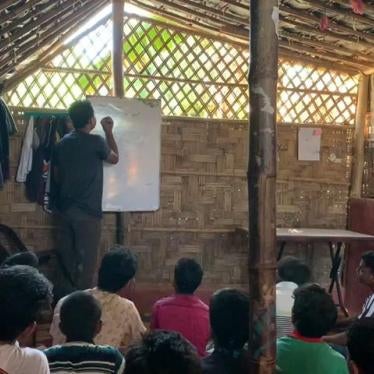(New York) - Australian political party leaders should publicly endorse reforms to meet the nation's international legal obligations to asylum seekers and migrants, Human Rights Watch said today in a letter to the party leaders. Immigration and asylum issues have been part of the national debate in the lead up to the country's federal election on August 21, 2010.
Human Rights Watch expressed its ongoing concerns with Australia's treatment of asylum seekers who arrive by boat, including mandatory and indefinite detention, accommodation in remote locations away from essential services, suspension of asylum processing for certain nationalities, and exclusion from Australia's protection visa system.
"People fleeing desperate situations have a right to seek asylum, and Australia should treat them fairly and respectfully," said Elaine Pearson, acting Asia director at Human Rights Watch. "This election gives Australia's parties a chance to show they support basic rights for everyone. They shouldn't waste it."
The Human Rights Watch letter makes specific recommendations for ensuring that Australia complies with its obligations under international human rights and refugee law. These include rejecting proposals to process asylum seekers offshore, treating asylum seekers in Australia humanely, amending Australia's people-smuggling laws, and incorporating human rights into Australia's regional efforts to counter smuggling.
The letter was sent to leaders of the Australian Labor Party, Liberal Party, National Party, Greens, Family First, and Democrats.
Human Rights Watch urged party leaders to reject the Australian Labor Party and Coalition proposals to divert asylum seekers offshore to countries such as Timor-Leste (East Timor) or Nauru. Both proposals are nearly indistinguishable from the expensive and ultimately ineffectual "Pacific Solution" of the Howard years and have little basis in international law or practice. Australia's plans for offshore processing are significantly different from practices within the European Union, for example, where asylum seekers may only be returned to countries through which they actually traveled, among states that have comparable asylum standards and procedures, and that have made a commitment to provide effective protection.
The debate on "human smuggling" into Australia has been colored by an over-emphasis on stopping boat arrivals and criminalizing immigration, Human Rights Watch said. Overly broad provisions in Australia's Anti-People Smuggling and Other Measures Act 2010 may permit the criminal prosecution of humanitarian acts and interfere with the ability of people to obtain asylum. The Bali Process, a regional body that Australia co-chairs with Indonesia to coordinate action against people smuggling, has taken a strictly law enforcement approach to irregular migration at the expense of human rights. Human Rights Watch urged party leaders to pledge to resolve these issues in line with international standards.
As a party to the 1951 Convention Relating to the Status of Refugees and its 1967 Protocol, Australia is prohibited from returning refugees to places where their lives or freedom would be threatened. Under this treaty, Australia made a commitment to protect the physical security and human rights of refugees and asylum seekers.
"Australia's preoccupation with ‘stopping boats' risks cutting off asylum to those who really need protection," Pearson said. "Australia receives a comparatively small number of the world's refugees. It should be a leader in the region in protecting human rights not in devising ways to avoid its international obligations."





